Funding
Horizon Europe (2021-2027)
'Horizon Europe is the Framework Program for Research and Technological Development (P.C.R.D.T), also called Framework Program, or abbreviated FP (for Framework Programme). It is the main funding tool for research and innovation at European level. This framework program was created in 1984, and the various programs follow each other every 7 years. Framework Programme 7 (FP7) and Horizon 2020 are the predecessors of Horizon Europe, which today represents the 9th framework programme financed by the European Commission since its creation.
Why Europe funds R&I
The European Union wishes to fund R&I to meet the following objectives:
- Strengthen the European Union's position in the world in the fields of research, innovation and technology.
- Ensure Europe's competitiveness by investing in the technologies and professions of the future, in the service of "intelligent, sustainable and inclusive" growth.
- Take into account the concerns of citizens (health, environment, clean energies, etc.) and provide solutions to societal challenges.
- Enhance the attractiveness of European research.
Europe's structure for funding R&I
With a budget of 95.5 billion euros, Horizon Europe is the most ambitious research support program in the world. It is based on 5 mission areas:
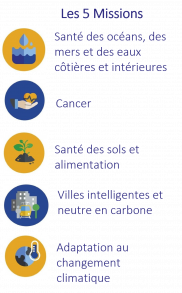
- The health of oceans, seas and coastal and inland waters
- Cancer
- Soil health and food
- Smart and carbon-neutral cities
- Adaptation to climate change
The European Union's research and innovation programs aim to support projects throughout the innovation chain (from ideation to commercialization), and to streamline funding in favor of growth.
Depending on the objective and technological maturity of your projects, the calls will depend on different thematic programming, which are divided into three program pillars covering the entire funding continuum.
Les 3 piliers d'Horizon Europe
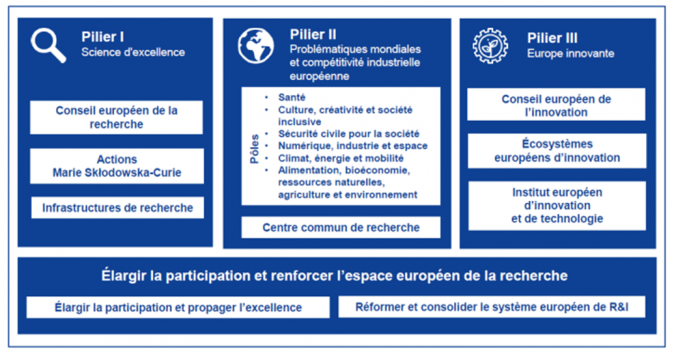
Pillar 1: Scientific Excellence
The first pillar, "Science of Excellence", aims to support basic research projects through the European Research Council, as well as funding exchanges and scholarships for researchers. This pillar also supports networking, access and the development of research infrastructures.
Pillar 2: Global issues and European industrial competitiveness
The second pillar, "Global Issues and European Industrial Competitiveness", aims to support work and research related to these famous societal issues such as, among others, health, security for society, digital, industry, food, bioeconomy and natural resources. Collaborative, multidisciplinary projects are concentrated within this pillar.
Pillar 3: Innovative Europe
The third pillar, "Innovative Europe", aims to support innovation close to the market; where an innovative startup or SME can present an innovative project on its own and be supported by the European Innovation Council (EIC).
Types of action
Research and innovation programs can be broken down into several types of action, depending on a number of criteria: the scope of the project, the expected level of technological maturity, or the objectives. Associated with these actions are a number of participation modalities: eligibility criteria, funding rates, duration, budget, etc.
The devices and associated projects fall into two broad categories:
- Collaborative projects involving, except in special cases, a minimum of three legal entities established in member states or associated states, and more often between 10 and 20 partners for most collaborative projects.)
- Individual projects where a single institution submits and carries out a project.
European Funding and Cybersecurity
Cybersecurity in the European Union: a strategic priority
The 3 main programs that group together funding related to cybersecurity are :
- Horizon Europe with, as already mentioned, 95.5 billion euros in funding over 7 years, including almost 460 million euros for cybersecurity,
- Digital Europe Programme (Digital Europe Programme) with a budget of 7.59 billion euros, including over 1.65 billion euros for cybersecurity,
- Connecting Europe Facility 2, with a budget of over 28 billion euros, will dedicate over 2 billion euros to cybersecurity over 7 years.
These financing instruments are accessible to all types of organization: public authorities, research centers, cyber producers and/or consumers (SMEs, ETIs, large groups), critical infrastructure operators, and academics.
Project typology
Under Pillar 2 of Horizon Europe, there are two main types of instrument to fund projects at different levels of technological maturity, covering the whole spectrum of research from ideation to market.
Research and Innovation Actions
The first scheme is called "Actions de Recherche et d'Innovation (RIA)" and finances technologies, processes or services that are very close to ideation, i.e. fundamental research or research in the process of being applied; this ranges from experimental proof of concept to validation of the technology in a real, but not operational, environment. RIAs last between 12 and 36 months, and 100% of direct costs are eligible for any player.
Innovation Actions
The second scheme is called "Actions d'Innovation (IA)", an instrument designed to finance projects with a level of technological maturity closer to the market, and whose activities will be focused primarily on demonstrations, prototype development or pilots to validate the technology in an operational environment. These are projects lasting 3 to 5 years, with a different funding rate for private players (70%) compared with 100% for public players.
These two schemes are no exception to the rule of fierce competition on a European scale, with success rates ranging from 10 to 20% depending on the themes targeted.
Expectations of the European Commission
The European Commission's vocation is to fund projects of excellence, which are complex, multidisciplinary and have a major impact.
- Large-scale projects with a large number of partners and a wide variety of :
- Organizations: start-ups, companies, major groups, cities, R&D institutions, universities, etc.
- Fields/disciplines represented
- Who are developing :
- Fundamental research, pilots, demonstration projects, scale-up of European companies with disruptive solutions.
- High expectations for projects :
- High impact
- Visible to European citizens
- Replicable and expandable
Financing support
There are many public and private structures offering a complementary range of services in the various phases of project preparation and definition.
National Contact Points: a team of National Contact Points (NCPs) has been set up in all Horizon Europe beneficiary countries, at the request of the European Commission. The French Ministry of Higher Education, Research and Innovation (MESRI) deploys, pilots and coordinates the NCP team, whose aim is to ensure French participation in European innovation funding and research schemes.
Bpifrance: has developed financial tools enabling innovative French SMEs to call on innovation consulting services to help them draw up their applications; in particular, the International Technological Partnership Diagnostic and the Europe Diagnostic.
Consulting firms : These offer a wide range of services tailored to customer needs, from one-off assignments (on Intellectual Property issues, or on drafting a part of the dossier) to support for the entire project set-up. The Association des Conseils en Innovation's Collaborative Projects Commission maintains a list of member companies with expertise in European projects.
Competitiveness clusters, rural excellence clusters and thematic clusters: these structures offer services linked to the setting up of European projects, such as help in finding partners, proofreading dossiers, but also monitoring calls for projects in their sector. Each cluster or pole has a specific range of services.
Partnership - Campus Cyber and FI Group
Campus Cyber and FI Group have embarked on a partnership in 2022 to build together a proactive and concerted approach to responding to calls for projects. The objectives of this approach are to:
- Increase the success rate of the ecosystem's project filings
- Position the ecosystem in future cyber domains
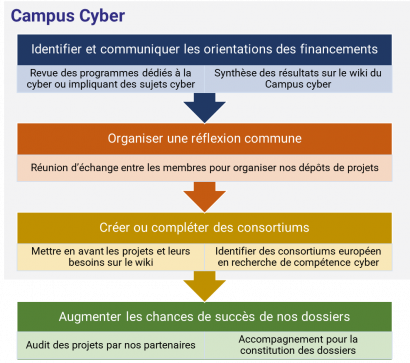
About FI Group
FI Group offers customized support throughout the entire project set-up process. This support is based on the key stages of a project's set-up: identification, feasibility study, consortium set-up, proposal preparation and follow-up of the project's appraisal. If the project obtains funding, Fi Group then acts as the partner responsible for supporting coordination as well as dissemination, communication and exploitation (D&C&E). FI Group also offers project management consultancy (subcontracting) for specific requests.
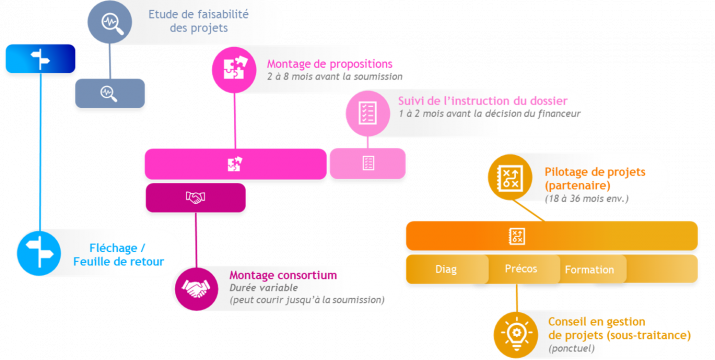
Links
Horizon Europe : https://research-and-innovation.ec.europa.eu/funding/funding-opportunities/funding-programmes-and-open-calls/horizon-europe_en
Horizon Europe - Cluster 3 : "Civil security for society: https://rea.ec.europa.eu/funding-and-grants/horizon-europe-cluster-3-civil-security-society_en
Horizon Europe - Cluster 4 : "Digital, Industry and Space: https://research-and-innovation.ec.europa.eu/funding/funding-opportunities/funding-programmes-and-open-calls/horizon-europe/cluster-4-digital-industry-and-space_en
Connecting Europe Facility : https://ec.europa.eu/inea/en/connecting-europe-facility
Digital Europe Programme : https://digital-strategy.ec.europa.eu/en/activities/digital-programme
PCN Horizon Europe : https://www.horizon-europe.gouv.fr/les-points-de-contact-nationaux-24230
FI Group : https://grants.fi-group.com/
Association des Conseils en Innovation : https://www.asso-conseils-innovation.org/
BPIFrance: https://www.bpifrance.fr/
Contact
For further information, please contact: communautes@campuscyber.fr
Booklets
Financements cybersécurité 2022 : download
Financements cybersécurité 2023 : download
Financements cybersécurité 2024 : download
Pitches SMI2G 2023 : download
